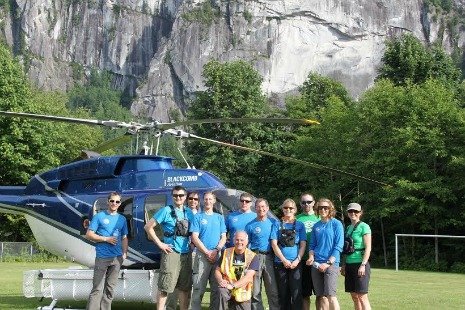
WHATEVER you call John Howe, don’t call him a hero. He says it’s a word that makes him cringe and his face wears that discomfort as he says the word. But not everyone would agree with him — not the emergency room doctor struck on a ledge on the Chief with multiple injuries, not the senior who lost consciousness after a disorienting few hours in the woods, and certainly not the hypothermic patient whose heart almost gave up as she lay unconscious in the snow.
Nor would anyone who has ever been in trouble and heard the soothing roar of the search-and-rescue helicopter and seen volunteers like Howe waiting to get them back to safety. Howe, the unassuming director of Squamish Search and Rescue, was recently awarded the BC Public Safety Volunteer Award. He has been involved with the Squamish Search and Rescue (SAR) for 28 years. Howe joined the SAR team as a volunteer in 1987. After him, Perry Beckham and Scott Flavelle were invited to join because of their climbing expertise. Howe has taken part in hundreds of search-and-rescue although he admits it’s easy to lose count when you have been giving back as a volunteer for almost three decades. And that is what got him started in SAR in the first place. “We had the climbing skills and expertise, and it was a way to give back to the community, and being part of the group was the way for me to do that,” he says.
The summer is the busiest time for SAR volunteers and they can attend to as many as 40 calls for help—and everyone has to be treated as an emergency call with the clocks ticking. When he first joined SAR, it was a small group with few calls. But as Squamish and its popularity grew, so did the call volume. Easy availability of cell phones also meant more calls to SAR, which recently helped a young man who called 911 from the Chief because he had leg cramps. “People were more self-sufficient back in the day but now Squamish SAR is one of the busiest search-and-rescue organisations in the entire province,” he says.
A blaring horn of a ring call accompanies the letters SAR on John Howe’s cell phone. It’s a call from Princeton where SAR members are calling to ask for help and advice. Howe runs his own forest consultancy business, and it has suffered because of his volunteer activity. As a volunteer, he can say no to a call and he has but more often, it’s a yes and a rush to the rescue. After a quick change of clothes, Howe drives to the SAR compound near Brennan Park where volunteers gather for a quick meeting before they proceed to the rescue. Some of the calls can take six hours as volunteers have to clean the equipment and ready it for the next call. Howe can recall many days when he could focus on his business but when the call came, he said yes. He has never really wanted to quantify the loss of business due to his volunteer work.
What is also unquantifiable is the gratitude he receives from those him and his SAR colleagues help. There have been too many cards and calls and letters of thanks to recount. People grateful for their service have bought dinners. Recently a woman bought boxes full of cookies, some of them frozen to be eaten later. Last Christmas, Howe also received a CD and a Christmas card from Christine Newman, a young woman who escaped death due to Howe’s quick thinking about her medical condition. Newman was found hypothermic, non-responsive and in cardiac arrest about half a kilometre from Elfin Lake in Garibaldi Provincial Park. As SAR volunteer rushed to help her, Howe called up Dr. Doug Brown, a Lions Bay emergency room doctor, who also trains SAR volunteers. Dr. Brown convinced emergency crews to take Newman to Vancouver General Hospital instead of Squamish hospital as was the protocol, thus saving her life. Because of that case, BC Ambulance has now changed its protocol for dealing with hypothermic patients. In this case, Howe was able to recall information from some of the previous sessions which helped save Newman’s life.
Working in the search-and-rescue has taught Howe more than a few things about human beings and nature. Even though we live in a comfortable cocoon, we are surprisingly resilient. “The average person is far more resilient than they think. People think they will die if they are stranded on the Chief for a night but they won’t. The body’s will to live and survive is very strong,” he says.
Yet, he says he has also learned to not be judgmental about people since he knows a wrong turn or dead cell phone batteries or a hike in an isolated area can make things go awry. Howe says he would continue to volunteer for as long he is useful. There is something satisfying about helping someone without any expectation and then there is the thrill of a small adventure and something new to be learned every day.
“It feels good that I helped somebody without any expectation and when that bell goes off, I have no idea where I’m going — will it take me to the Chief or the Lake Lovely water? It’s a mini adventure and I will keep doing it as long as I’m useful to the group,” he says.

